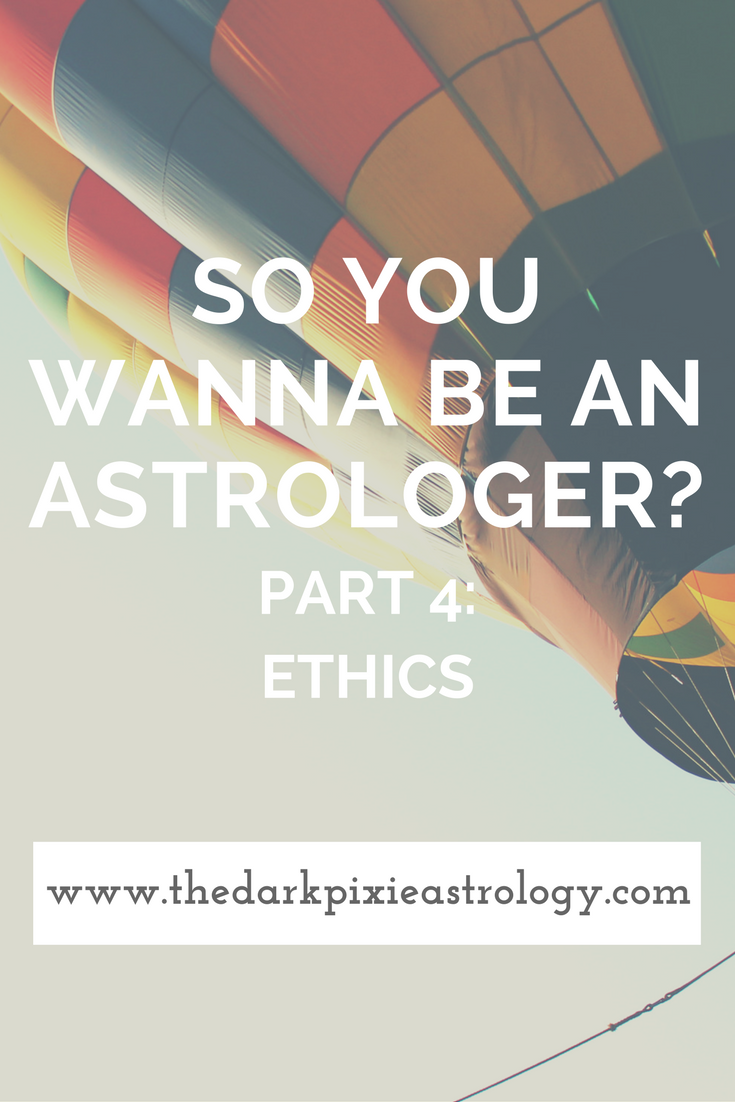|
There can be murky waters being an astrologer. When you’re consulting with people about their lives, and getting intimate knowledge about their lives, murky waters are always close by. What kind of ethics should you abide by? Confidentiality is an absolute must.
First and foremost, confidentiality is an absolute must. People need to know they can trust that you won’t spill the beans about their lives (unless, of course, you’re made aware of illegal activity that can harm people, especially minors, or any kind terrorist activity - that would be common sense, I think!).
The NGCR-PAA has a decent code of ethics that you should read here (it only applies to members, but is a good basic outline for all astrologers): http://www.astrologersalliance.org/about-us/ethics-statement.html The one thing I don’t quite go with in that code is not confusing or being offensive to others. Yes, you should try not to confuse people or offend them, but the problem is, there are people who are confused or offended by everything, and you can’t control what people understand or will accept 100%. So you do your best, but know you can’t please or reach everyone. Some people just wanna be mad and take stuff out on you. Keep your laws in mind
Legally, you shouldn’t perform readings for anyone under 18, and you’re required in some places to say that it’s for “entertainment purposes only” and that a reading “isn’t a substitute for legal, medical or other professional advice.” There may be other legal requirements of you depending on where you're located, so look into it where you are.
Medical astrologers tend to be the ones who have to be the most careful. With medical astrology, you have to make sure that you’re clear about this not being a substitute for seeing a doctor, taking medications, receiving treatments, etc., and that you’re not a medical professional (unless, of course, you actually are, so it might be a good idea to have a medical background). If you practice medical astrology, financial astrology, or legal astrology, it's actually required in many places you have the educational background for that (so an actual medical, finance, or legal degree) and that you're licensed (this is also true for psychological astrologers in many places, so do check). Disclose your rules
Disclose your rules about your readings/consultations to someone beforehand, if you have any (including what you will/won’t cover, follow-up question policies, and refund policies).
It’s usually a good idea to say that you have the right to refuse to perform any reading at any time for any reason. This covers you when you stumble upon someone you want to run away from as far as you can. Yes, those nut jobs are going to come, so don’t be afraid to walk away. If you find they have a mental health issue they’re not addressing, a substance abuse problem, engage in harassing or abusive behavior, you can and should terminate the consult immediately, give a refund, and move on. When you cut it off, be quick and as least-offensive as you can be, but they probably won’t take it well, so be prepared for some anger. For some comfort, most people in that position will be too concerned about other people knowing their problems, so they won’t air their grievances publicly. It’s also a good idea to make clear that you’re not responsible for outcomes, and that everyone has their own free will. Keep in mind your statements too
Generally, you shouldn’t address anything definitively, making statements like, “You’ll never get married,” or “You’ll never have children.” "Never" is a long time!
Death is also a dicey subject that’s usually best steered away from; if you see strong death energy in a reading with someone, approach it delicately, and always offer the other ways the energy can manifest. So, that concludes this series of posts on how to become an astrologer! In case you missed the first 3, here they are: Part 1: Study and Practice Part 2: Specialize Part 3: It's a Business Comments are closed.
|
|




 RSS Feed
RSS Feed
